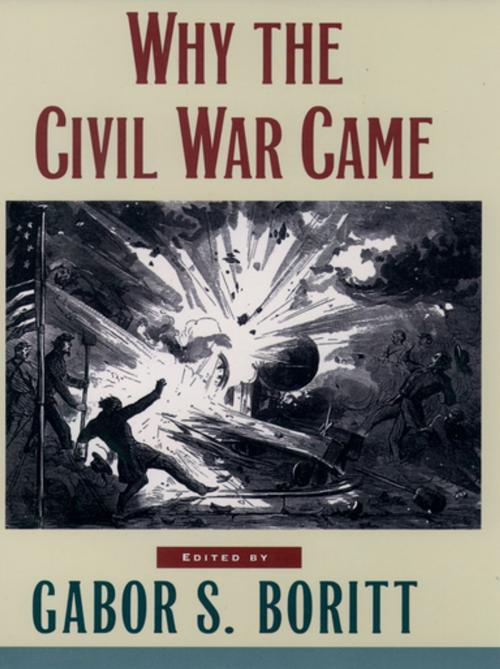Why the Civil War Came
Nonfiction, History, Americas, United States, Civil War Period (1850-1877), Military| Author: | ISBN: | 9780199879625 | |
| Publisher: | Oxford University Press | Publication: | January 11, 1996 |
| Imprint: | Oxford University Press | Language: | English |
| Author: | |
| ISBN: | 9780199879625 |
| Publisher: | Oxford University Press |
| Publication: | January 11, 1996 |
| Imprint: | Oxford University Press |
| Language: | English |
In the early morning of April 12, 1861, Captain George S. James ordered the bombardment of Fort Sumter, beginning a war that would last four horrific years and claim a staggering number of lives. Since that fateful day, the debate over the causes of the American Civil War has never ceased. What events were instrumental in bringing it about? How did individuals and institutions function? What did Northerners and Southerners believe in the decades of strife preceding the war? What steps did they take to avoid war? Indeed, was the great armed conflict avoidable at all? Why the Civil War Came brings a talented chorus of voices together to recapture the feel of a very different time and place, helping the reader to grasp more fully the commencement of our bloodiest war. From William W. Freehling's discussion of the peculiarities of North American slavery to Charles Royster's disturbing piece on the combatants' savage readiness to fight, the contributors bring to life the climate of a country on the brink of disaster. Mark Summers, for instance, depicts the tragically jubilant first weeks of Northern recruitment, when Americans on both sides were as yet unaware of the hellish slaughter that awaited them. Glenna Matthews underscores the important war-catalyzing role played by extraordinary public women, who proved that neither side of the Mason-Dixon line was as patriarchal as is thought. David Blight reveals an African-American world that "knew what time it was," and welcomed war. And Gabor Boritt examines the struggle's central figure, Lincoln himself, illuminating in the years leading up to the war a blindness on the future president's part, an unwillingness to confront the looming calamity that was about to smash the nation asunder. William E. Gienapp notes perhaps the most unsettling fact about the Civil War, that democratic institutions could not resolve the slavery issue without resorting to violence on an epic scale. With gripping detail, Why the Civil War Came takes readers back to a country fraught with bitterness, confusion, and hatred--a country ripe for a war of unprecedented bloodshed--to show why democracy failed, and violence reigned.
In the early morning of April 12, 1861, Captain George S. James ordered the bombardment of Fort Sumter, beginning a war that would last four horrific years and claim a staggering number of lives. Since that fateful day, the debate over the causes of the American Civil War has never ceased. What events were instrumental in bringing it about? How did individuals and institutions function? What did Northerners and Southerners believe in the decades of strife preceding the war? What steps did they take to avoid war? Indeed, was the great armed conflict avoidable at all? Why the Civil War Came brings a talented chorus of voices together to recapture the feel of a very different time and place, helping the reader to grasp more fully the commencement of our bloodiest war. From William W. Freehling's discussion of the peculiarities of North American slavery to Charles Royster's disturbing piece on the combatants' savage readiness to fight, the contributors bring to life the climate of a country on the brink of disaster. Mark Summers, for instance, depicts the tragically jubilant first weeks of Northern recruitment, when Americans on both sides were as yet unaware of the hellish slaughter that awaited them. Glenna Matthews underscores the important war-catalyzing role played by extraordinary public women, who proved that neither side of the Mason-Dixon line was as patriarchal as is thought. David Blight reveals an African-American world that "knew what time it was," and welcomed war. And Gabor Boritt examines the struggle's central figure, Lincoln himself, illuminating in the years leading up to the war a blindness on the future president's part, an unwillingness to confront the looming calamity that was about to smash the nation asunder. William E. Gienapp notes perhaps the most unsettling fact about the Civil War, that democratic institutions could not resolve the slavery issue without resorting to violence on an epic scale. With gripping detail, Why the Civil War Came takes readers back to a country fraught with bitterness, confusion, and hatred--a country ripe for a war of unprecedented bloodshed--to show why democracy failed, and violence reigned.















